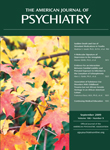Drs. Scott, Najman, and McGrath Reply
To the Editor: We thank Mr. Richardson for drawing attention to the likely relationship between low socioeconomic status in childhood and adult delusional-like experiences. Low socioeconomic status in childhood is associated with a wide array of adverse health outcomes, affecting both physical (1) and mental health (2) . We are also interested in the influence of socioeconomic status on adult delusional-like experiences and adult psychosis but would like to consider a number of potential confounding factors. For example, parental mental health problems would be associated with both low childhood socioeconomic status and an increased risk of delusional-like experiences in offspring (3) . Abuse in childhood is known to be more prevalent in families with low socioeconomic status, but this exposure is also associated with psychotic symptoms in adulthood (4) . Thus, any relationship between childhood socioeconomic status and adult delusional-like experiences would probably be complex and warrants detailed and focused investigation. We look forward to reporting our findings in this area in future studies and encourage further exploration of the many factors influencing pathways to psychosis.
1. Krieger N: Why epidemiologists cannot afford to ignore poverty. Epidemiology 2007; 18:658–663Google Scholar
2. Werner S, Malaspina D, Rabinowitz J: Socioeconomic status at birth is associated with risk of schizophrenia: population-based multilevel study. Schizophr Bull 2007; 33:1373–1378Google Scholar
3. Varghese D, Scott J, McGrath J: Correlates of delusion-like experiences in a non-psychotic community sample. Aust N Z J Psychiatry 2008; 42:505–508Google Scholar
4. van Os, J, Linscott, RJ, Myin-Germeys I, Delespaul P, Krabbendam L: A systematic review and meta-analysis of the psychosis continuum: evidence for a psychosis proneness-persistence-impairment model of psychotic disorder. Psychol Med 2009; 39:179–195Google Scholar



